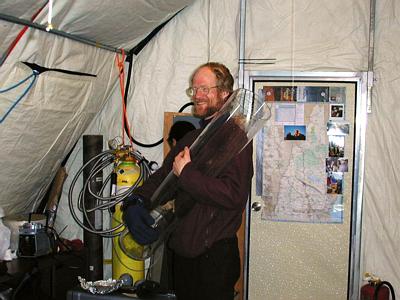
|
|
12 June, 2000
Five sample bottles were all lined up on the table. Behind them were
ominously tall flasks, jars with long plastic tips, and serious- looking
reagent bottles. Time for the test- calibration test for the Ionic
Chromatograph (IC). Could I mix standard solutions so that they fit a
straight-line graph on the computer? Wearing sterile gloves, which, as we
all know, always help with dexterity, and never passing my arm over any
open container (a flake of skin can drive that little line wild), I began.
The first step involved a new twist on pick-up sticks. One had to
manipulate the pipette tip onto the pipette without touching either with a
hand. Then came the multiple sterile water rinses. Time to set up the 5
levels of standard solution. Just so much water in each bottle and then a
sort of sharing/transfer of reagent down the line so that the next bottle
ended up with half the reagent as the previous one. Oh, and touching any
bottle rims was a no-no. Matt led me through setting up a method and
schedule for calibration on the computer program for the IC. We had to work
my calibration runs in between the actual sample runs that were using
Matt's calibration so it took a large portion of the morning to get through
all 5. At last, the proof - did the peak values on the standard graphs
create a straight-line graph themselves as they should? My acetate graph
was perfect, but I had one slightly wayward point on the formate graph. Not
bad for the first time, but not a 100% either. Oh well.
Wednesday will be be my last day in Summit. Tomorrow I hope to walk out to
the Greenland Ice Sheet Project Two (GISP2) site. There is an ice core hole
that goes clear into the bedrock, a depth of over 3000 meters and
represents greater than 250,000 years of ice core record.
Warm regards,
Besse Dawson

Dr. Richard Honrath demonstrates his glee of good data by waltzing the snow chamber around the science weatherport! > <>

Contact the TEA in the field at
.
If you cannot connect through your browser, copy the
TEA's e-mail address in the "To:" line of
your favorite e-mail package.
|
